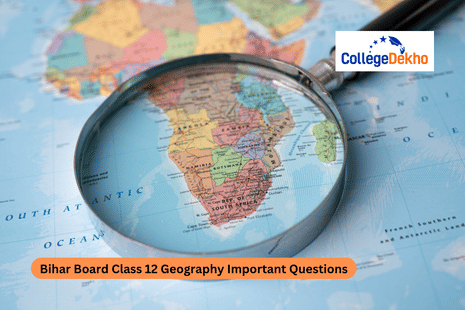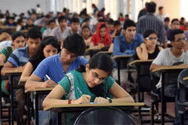

Never Miss an Exam Update
Bihar Board Class 12 Geography Important Questions 2026 helps you identify the important topics from which you can expect questions in the final exam. You can solve the important questions after completing your Bihar Board Class 12 Geography Syllabus 2025-26 to revise for the final exam. The Geography Question paper will consist of three types of questions, starting from MCQs, followed by short answer type questions for 2 marks each, and lastly, there will be long answer type questions for 5 marks each. A total of 70 MCQs will be included in the question paper, out of which you are only required to answer 35. Internal choices will be present all over the question paper. As per the Bihar Board Class 12 Geography Exam Pattern 2026 , the theory question paper will be conducted for 70 marks. Check out some of the main Bihar Board Class 12 Geography Important Questions 2026 here.
Bihar Board Class 12 Geography Important Questions 2026 of 1 Mark
The Geography Question paper will consist of MCQs in the very first section. You are required to answer 35 MCQs out of 70 present in the question paper. Check out some important questions for Geography for one mark here. These questions are taken from the latest model test papers as well as previous years' question papers:
Question 1: Who among the following scholars has determined the Human Development Index?
(A) Ritter (B) Prof. Amartya Sen (C) Dr. Mahbub-ul-Haq (D) E. C. Semple
Question 2: The Orient Express railway is in :
A. Europe B. Asia C. North America D. Australia
Question 3: What is the percentage of Bituminous type out of the total coal found in India?
A. 10 % B. 50% C. 80% D. 15%
Question 4: Which of the following is the leading state in Soybean production?
(A) Uttar Pradesh (B)Madhya Pradesh (C)Goa (D)Bihar
Question 5: Where is the headquarters of the World Trade Organization?
(A) Geneva (B) Vienna (C) New York (D) Washington
Question 6: Which of these is not a tourist town?
A. Mussoorie B. Udagamandalam C. Mount Abu D. Ankaleshwar
Question 7: When was the Atomic Energy Commission established?
(A) 1948 (B) 1950 (C) 1951 (D) 1960
Question 8: The Great Lakes waterway is associated with which continent?
(A) Europe (B) Asia (C) Africa (D) North America
Question 9: Which of these is an ancient city?
A. Nalanda B. Chandigarh C. Barauni D. None of these
Question 10: Rawatbhata is in which state?
(A) Rajasthan (B) Uttar Pradesh (C) Gujarat (D) Goa
Also Read: Bihar Previous Year Question Papers Class 12 with Solutions
Bihar Board Class 12 Geography Important Questions 2026 of 2 Mark
In the second section of the question paper, very short answer-type questions for 2 marks will be included. There will be a total of 20 questions, out of which you are required to answer 10 only. Check out some important two-mark questions below:
Question 1: Distinguish between site and situation.
Question 2: Write the names of two types of compact settlements.
Question 3: Mention non-conventional sources of energy.
Question 4: Write the names of four important nuclear power centres of India.
Question 5: What is the main objective of the World Trade Organisation?
Bihar Board Class 12 Geography Important Questions 2026 of 5 Mark
In the last section, there will be long-answer type questions for 5 marks each. You are required to answer only three questions out of the 6 questions present in the section. You can refer to some of the most important questions for 5 marks below:
Question 1: Draw a map of India and show the following: (A) Paradip, (B) Neyveli, (C) Kanpur, (D) Bodh Gaya, and (E) Mahanadi
Question 2: Discuss the causes of water pollution in India.
Question 3: Give an account of the production and distribution of petroleum in India
Question 4: Discuss the problems of Indian agriculture.
Question 5: Discuss the role of the railway in the economic development of India.
Also Read: Bihar Board Class 12 Geography Model Paper 2026
What is the Bihar Board Class 12 Geography Syllabus 2026?
As per the new PDF released on the official website of BSEB, the Geography syllabus is divided into two parts. You can check out the latest syllabus from the table given below:
Part 1
Unit | Key Concepts |
|---|---|
1. Fundamentals of Human Geography | - Nature and Scope |
2. People | Population of the world: distribution, density, and growth Population change, spatial pattern, and structure Determinants of population changes Age and Sex Ratio Rural-Urban composition Human development, Concept, selected indicators, International comparison |
3. Human Activities | - Primary activities: Concept and changing trends, gatherings, Pastoral nomads, subsistence agriculture- Secondary activities: Concept, manufacturing, Agro-processing, Household, small scale, large scale- Tertiary activities: Concept, Trade, Transport and Communication- Quaternary activities: Knowledge-based industry, Information Technology – USA, Britain, India and its contribution |
4. Transport, Communication & Trade | - Land Transport: Road, Railways, Air, Water Satellite communication, cyber zone International Technology – USA, Britain, India and its contribution |
5. Human Settlement | - Types, characteristics & development – Rural & Urban- Morphology of cities- Problems related to human settlements in developing countries |
Part 2
Unit | Key Concepts |
|---|---|
1. Introduction | - Location, Neighbourhood relations, and place of India in the world |
2. Physical Aspects & Drainage System | - Physiography, relief, Drainage system, Physical divisions |
3. Climate, Vegetation, and Soil | - Weather & climate, Distribution of temperature, pressure, winds & rainfall, Indian monsoons - Natural vegetation – types and distribution, Wildlife conservation - Soil – Major types (ICAR classification), their distribution and conservation |
4. Resources and Development | - Land resources: Agricultural land use, major crops and agricultural development, and problems - Water resources: Achievements and usages, problems and conservation - Mineral and energy resources: Metals and non-metals, minerals and their distribution, conventional and non-conventional resources of energy |
5. Transport, Communication & International Trade | - Road, Railways, Waterways, Airways, Gas and oil pipeline, National electricity grid |
6. Population | - Distribution, density & growth, composition of population, language and religion, rural-urban population |
7. Natural Hazards and Management | - Flood and Drought, Earthquake and Volcano, Landslides, Cyclones, Tsunami |
Make sure to go through these Bihar Board Class 12 Geography Important Questions 2026 once you have completed your syllabus to understand the concepts completely. Check your answers with the help of the answer keys to review your preparation level.
FAQs
In the last section of the Bihar Board Class 12 Geography question paper, there will be 6 Long Answer Type questions, out of which any 3 questions are to be answered. Each question carries 5 marks.
To revise the Bihar Board Class 12 Geography syllabus, you can either go through the model test papers available on the official website of Bihar School Examination Board or efficiently solve the important questions present here. Do not forget to also practice the previously asked questions.
Bihar Board Class 12 Geography Syllabus is divided into two parts, and both parts are equally important. In the first part, you should focus more on human activities, and in the second part, you need to study the “Resources and Development” topic carefully.
Yes, there will be internal choices present in the Bihar Board Class 12 Geography question paper in each section. You need to read the instructions carefully before attempting every section. If more than 35 questions are answered in the first section, only the first 35 answers will be evaluated.
A total of 70 MCQs will be included in the Bihar Board Class 12 Geography, out of which you are required to answer only 35. Each MCQ will carry one mark, and you just have to choose the correct option out of the four options displayed for each question.
Was this article helpful?

























